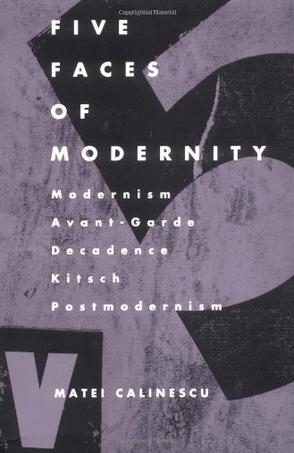-

民困愁城
本書的知識-政治主旨可表達如下:本書揭示公共世界與私人生活的互相關連,因此談論經濟、政治、資本等議題時不能不論及性、情緒、個性(自戀)文化等等之作用,反之亦然。然而本書同時也指出:公與私無法彼此完全相通──本書在探討憂鬱症時很清楚地顯示:社會壓迫與客觀的現代動力固然是憂鬱症的成因條件,但是仍有個人身體、家庭關係與生命史的偶然因素。這些不能被納入公共的偶然,雖然屬於私密領域,不能被社會完全建構或被政治方案改造,但是卻又有十足的政治蘊涵,可以用來說明那些企圖「透過公共集體努力來改造偶然私密」的政治路線之不可行,例如保守的傳統主義者、女性主義、禁慾左派的路線等(不論是反變態、反色情、反不文明)。同樣的,因為這些無法被社會建構與公共努力所掌握的偶然因素作祟,(壞)情緒無法完全納入社會的理性管理,相反的,社會控制與情感理性化的企圖反而持續產生不適當或沒來由的情緒,易言之,某些情緒管理反而帶來無法管理的情緒。 一言以敝之,本書指出:「情感的理性化」與「獸性的文明化」均有其限度,故而「道德進步」亦有其限度。 本書是處理情感現代性與情緒疾病的學術論著,對流行的進步觀念與批判成見提出質疑。本書同時也解釋了當代思潮與批判理論的許多基本觀念與學術常識,部份章節可供對社會運動有研究興趣的學生閱讀,還有部份章節也適合對情緒哲學有興趣的哲學學生。 本書從批判理論與情緒哲學這兩種取向探究心理疾病與社會的關連,延續著性政治對公∕私區分的辯證,主張被視為私密的情感情緒應該是社會批判理論的基本核心範疇,而且公共無法窮盡私密的意義,社會與心理之間存在著斷裂縫隙。本書指出了(西方)現代性的黑暗面,認為高舉文明現代、政治正確的道德進步主義,看似與道德保守主義對立,其實兩者所構成的新道德主義是當代新自由主義的側翼。 -

Five Faces of Modernity
"Five Faces of Modernity" is a series of semantic and cultural biographies of words that have taken on special significance in the last century and a half or so: "modernity," "avant-garde," "decadence," "kitsch," and "postmodernism." The concept of modernity--the notion that we, the living, are different and somehow superior to our predecessors and that our civilization is likely to be succeeded by one even superior to ours--is a relatively recent Western invention and one whose time may already have passed, if we believe its postmodern challengers. Calinescu documents the rise of cultural modernity and, in tracing the shifting senses of the five terms under scrutiny, illustrates the intricate value judgments, conflicting orientations, and intellectual paradoxes to which it has given rise. "Five Faces of Modernity" attempts to do for the foundations of the modernist critical lexicon what earlier terminological studies have done for such complex categories as "classicism," "baroque," "romanticism," "realism," or "symbolism" and thereby fill a gap in literary scholarship. On another, more ambitious level, Calinescu deals at length with the larger issues, dilemmas, ideological tensions, and perplexities brought about by the assertion of modernity. -

Naomi
Junichiro Tanizaki’s Naomi is both a hilarious story of one man’s obsession and a brilliant reckoning of a nation’s cultural confusion. When twenty-eight-year-old Joji first lays eyes upon the teenage waitress Naomi, he is instantly smitten by her exotic, almost Western appearance. Determined to transform her into the perfect wife and to whisk her away from the seamy underbelly of post-World War I Tokyo, Joji adopts and ultimately marries Naomi, paying for English and music lessons that promise to mold her into his ideal companion. But as she grows older, Joji discovers that Naomi is far from the naïve girl of his fantasies. And, in Tanizaki’s masterpiece of lurid obsession, passion quickly descends into comically helpless masochism.